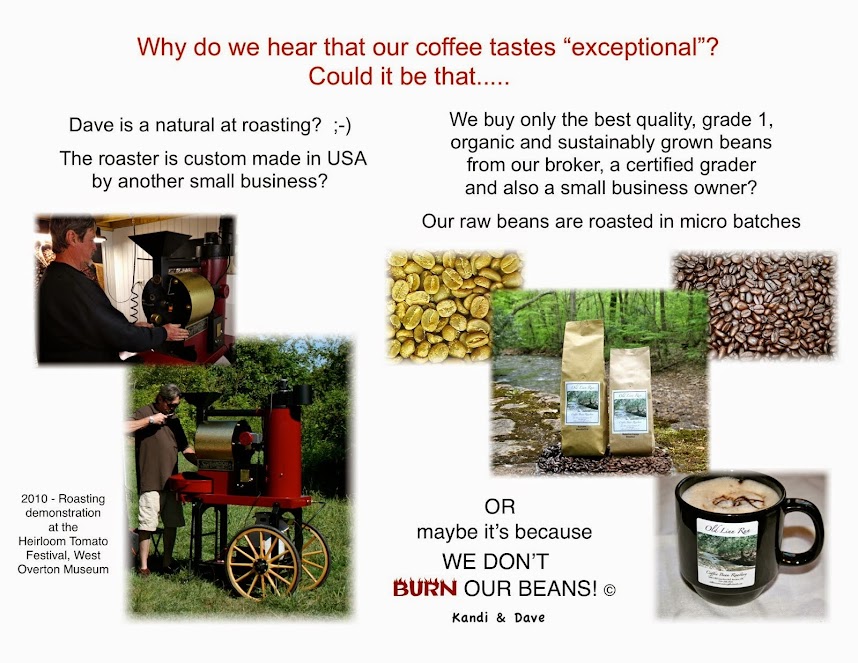changing the name a bit….
the ramblings from a "PAIN IN THE BUTT” on FRIDAYS
Today I want to discuss “FAIR TRADE”.
I know many of you have heard that term. A lot of people, like I, have heard the term and jumped on the proverbial bandwagon. I however, have learned more through the years and jumped off. I’m not so sure it is what it professes to be. The reason I bring this subject up is because many consumers are making purchasing choices based on just a little knowledge. You know what I mean…. just enough knowledge to make yourself dangerous. LOLWe have some very nice acquaintances that refuse to buy our coffee, along with others we probably don’t know about, because it is not “Fair Trade”. I attempted to explain the Direct Trade concept and they did not want to hear it. We have the same trouble at times when trying to market our coffee to a store for resale. In the case of our acquaintances, they are "very much into birds & the environment” and yet our Bobolink Farms Brazilian is of no interest to them. I posted a few videos further down on this blog about the farm. They have won sustainability awards, are a small family owned farm that has taken on the task of saving the Bobolink bird (+ any other creature that benefits as well) by farming shade grown coffee that produces excellent quality grade one beans. They plant fruit for the birds and have educated the other farmers ++++ Audubon has visited their farm. Now please, tell me why in the hell they would not purchase that coffee (if they liked the taste) ? The answer…..it’s not “Fair Trade”.
I inadvertently found an article from the STANFORD SOCIAL INNOVATION REVIEW, titled “The Problem with Fair Trade Coffee” by Colleen Haight summer 2011 To summarize a very long article:The Fair Trade concept began as a way to pay producers slightly above-market “fair trade” price provided they meet specific labor, environmental, and production standards— which was a very good ideal. "However, through the years the idea being sold to the consumer in actuality is not what is occurring. The reality is simple: consumers are not guaranteed to get a good quality coffee and the farmers are not getting all the funds directly into their pocket. "
- Membership in a cooperative is a requirement of Fair Trade regulations. Another core element is the premium—the subsidy (now 20 cents per pound over market value) paid by purchasers to ensure economic and environmental sustainability. Premiums are retained by the cooperative and do not pass directly to farmers. Instead, the farmers vote on how the premium is to be spent for their collective use. They may decide to use it to upgrade the milling equipment of a cooperative, improve irrigation, or provide some community.
- The quality of the coffee is not guaranteed to be of a good grade. Commodity coffee is broken into grades of coffee to determine the price. Specialty coffee is considered a higher price on top of that due to the flavors along with the grade. Fair Trade coffee is considered a “Specialty coffee” simply because of the certification but not necessarily due to the grade. Along with that comes the problem that if a farmer has, for instance, 2 bags of coffee to sell….one being a high grade worth $1.70/lb on the open market and another lower grade worth $1.20/lb, which will he sell on the open market vs to the Fair Trade? Fair Trade is offering $1.40/lb (20 cents over the market value). Which bag of beans do you think will be sold to Fair Trade for $1.40/lb? Quick….answer….. is it the good quality he can get $1.70 for elsewhere or the low quality? The answer of course is the low quality beans. Another problem is that sometimes the beans from many farms are thrown together before reselling, yet another way of not being guaranteed good quality beans.
You cannot be guaranteed that you are getting high quality beans and yet you are paying a high premium price just for the label stating “Fair Trade”. On the other hand, as with our coffee, the beans are purchased directly….thus the term “Direct Trade”. Our broker who is a certified grader, visits the farms, determines the grade of beans for the farmer’s resell purposes, and purchases, directly from that farm, only the highest quality beans. We are purchasing grade one, single origin beans. We want to roast only the best beans. We have been approached by other coffee brokers from Pittsburgh and elsewhere, with less expensive beans but we are not interested. We choose to buy only the best for our clients. We hope that you appreciate this too.
BTW, awhile ago we also had a new store in “the city" tell us that they only purchase beans from roasters that bought "directly from the farms"….. ironically, the roaster they purchase from sells direct and fair trade beans... but they do not travel to the farms to purchase. Yet another example of someone hearing a term but not fully understanding it.
Oh well. C’est la vie. Another day in the life of an entrepreneur. There are always encouraging and discouraging times. We only hope that the former outweighs the latter. ;~)


No comments:
Post a Comment